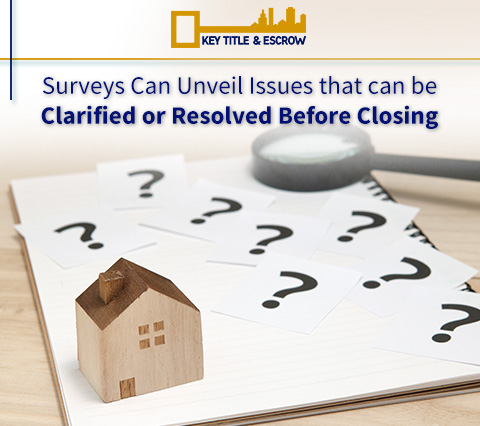What's a Property Survey, Why Do You Need One, and How Our Real Estate Settlement Services Can Help You
January 24, 2018
There is a lot of paperwork and transactions involved with buying a property, and one of them is a property survey. In Florida, buyers are required to have a property survey done when purchasing a house or townhouse, and all lending institutions will require one whenever a loan application is submitted. That is why, as a premier settlement services provider in Miami, we are offering you some insight on what a property survey is from the perspective of the buyer, why it is necessary, and how we can help. What Is a Homebuyer's or Property Survey?A property or land survey is sort of like a map of a property. Basically, it's a description of the property that indicates its legal boundaries and other features. As we stated before, this survey is mandatory for people who want to buy a house or townhouse, and the purchaser has to pay for the survey.
What Is a Homebuyer's or Property Survey?A property or land survey is sort of like a map of a property. Basically, it's a description of the property that indicates its legal boundaries and other features. As we stated before, this survey is mandatory for people who want to buy a house or townhouse, and the purchaser has to pay for the survey.Why Is It Necessary?Property surveys can serve multiple purposes. Though it is mainly done to describe the property and its boundaries, it can also uncover and/or clarify some issues such as:
- Discovering or Resetting Boundary Lines
Locating the precise boundary lines of your property has many advantages. It is a crucial piece of information that homeowners need to have if they want to build a fence, make additions to the property, or have the driveway paved. Survey often show that that homeowners and neighbors had been wrong about the location of the boundaries. The surveyor will provide a boundary line certification that will allow you to check if the legal description of the property is accurate. - Establishing the Zoning Classification
The survey may discover that the zoning classification of the property places specific restrictions on how it can be used. After the survey has confirmed the property's classification and jurisdiction, you can seek legal counsel to learn what you can and cannot legally use your property for. - Finding Gores and Gaps
The existence of gaps or gores can be a problem when the ownership of several adjoining pieces of land needs to be established. The problem with these unclaimed pieces of land, especially if they are along a street or right-of-way, is that they can potentially create a landlocked parcel. - Determining Unrecorded Easements and Other Facts Not of Record
There are many rights that are not found in any record, which means that they don't show up when carrying out a title search. However, they can affect a property's title. - Establishing Water Boundaries
A boundary that is determined by a body of water such as rivers, creeks, bays, etc. moves as the course of said body changes. However, if the change is sudden or due to actions of the property owner, the boundaries are not moved.
The typical property survey will only include visible or surface water, not underground water or wetlands. - Pointing Out Your Obligations to Your Neighbors
You could unknowingly be legally obligated to put up with your neighbor's driveway, party walls, among other things. - Existing Improvements
A professional property survey will certify that improvements, alterations, and repairs done to the property comply with laws and do not violate any zoning restrictions.
The surveyor will also inform you if there are any ordinance or other legal violations in any existing improvements. - Utility Infrastructure
The survey will either confirm if the information provided by utility companies and municipal authorities is accurate. Having this information is important because it can mean that the utility companies may have the right to use part of your property for infrastructure maintenance, and they could have the right to put certain limits on the usage of the property, such as tree length or location. Additionally, if or when you decide to make additions or improvements to the property, you'll know where you can and cannot do construction work. - Cemeteries
Even though this is not common, there could be an old burial ground on the property, and a survey will show you where they are. - Access, Ingress, and Egress
A property survey will state if vehicles can access public streets from the property. Additionally, it can also point out how adequate said access is for specific types of vehicles, such as emergency vehicles.
There are many advantages to having a property survey done on any house or land that you intend to buy before closing the transaction. Surveys can unveil issues that can be clarified or resolved before closing.
However, many homebuyers are not aware of this expense, and the survey is mandatory if you're buying a house in the Sunshine State.

If the property you're looking to buy is next to alleys, highways, roads, or streets, a survey will include a statement that there are no discrepancies between the boundary lines of the property and its adjoining land, unless otherwise stated in the survey report.
Examples of some unrecorded rights include "the right of a neighbor to use utility and sewer lines, drainage ditches, and travel easements that may have arisen by prescription or other ways of unwritten land transfer," according to the American Bar Association.
A survey will show all legal impositions that are reflected in the property title and other agreements.
 Key Title & Escrow understands that homebuyers incur a lot of expenses and unexpected situations can arise, which is why if you are a realtor who is representing a buyer, your client will be exempt from paying for the property survey.
Key Title & Escrow understands that homebuyers incur a lot of expenses and unexpected situations can arise, which is why if you are a realtor who is representing a buyer, your client will be exempt from paying for the property survey.Key Title & Escrow is a real estate settlement services provider in Miami that offers services throughout the state of Florida. We can help you swiftly close your real estate transactions anywhere in the state. Give us a call at (305) 235-4571 or fill out our contact form. Our representatives will be happy to answer any questions you have.
If you want to stay up to date with our news and get information about our real estate and title and escrow services, you can find us on Facebook as Key Title & Escrow, and follow us on Twitter @KeyTitle_Escrow.







